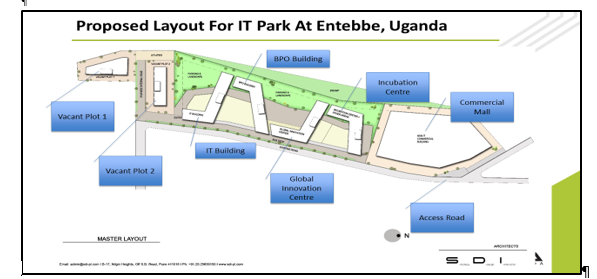Entebbe Iconic ICT Park
| Key information |
|---|
|
VALUE: USD 175.8 Million CONTRACTING AUTHORITY: National Information Technology Authority-Uganda REGION: Central SECTOR: ICT PHASE: Development |
The Government of Uganda (GOU) captured in its vision 2040 the objective to adopt Information and Communication Technology (ICT) as an enabler of social and economic transformation. The National Development Plan III was curated with the vision “A Transformed Ugandan Society from a Peasant to a Modern and Prosperous Country within 30 years with the overarching goal to “Increase Household Incomes and Improve Quality of Life of Ugandans”. Accordingly, 16.38 acres located at Katabi, Lunyo was earmarked for the development of the first in kind ICT Park in Uganda. Subsequently, several legislations were amended to foster investment in Information Technology and these included Investment Code Act, 2019, the Income Tax, Act 2020, the Excise Act 2020, the Value Added Services Act, 2020 among others.
National Information Technology Authority of Uganda (NITA-U) under the Ministry of Information Communication Technology and National Guidance (MoICT&NG) is an autonomous body established under the NITA-U Act, 2009. Its main mandate is to regulate and coordinate Information Technology Services in Uganda. NITA-U has been entrusted with the duty to develop the ICT Park. It hired MITCON Consultancy & Engineering Services Limited to offer transaction advisory services in 2017.
It is hoped that the ICT Park will enable Uganda to realize the goal of attaining a “middle-class income” by focusing on 5 core objectives which are:
-
Enhance value addition in key growth opportunities
-
Strengthen the private sector to create jobs
-
Increase stock and quality of productive infrastructure
-
Enhance productivity and social well-being of the population
-
Strengthen the role of the state in guiding and facilitating development
These objectives have been expressed in two broad areas which are the heartbeat of the ICT Park. These are: (i) ICT-enabled social and economic transformation across strategic sectors of the economy; and (ii) enhanced efficiency and effectiveness in the delivery of Government services by leveraging the internet and emerging technologies.
Although Uganda’s economy has grown at an average annual rate of 5.7% over the last 10 years, there has not been structural transformation in the economy in such a way as to create higher-earning jobs at scale. Indeed, the vast majority of the workforce is self-employed in subsistence agriculture and only 21% of the workforce is accounted for by wage and salaried. The Aspen report notes that without a structural change in the economy – moving more people from self-employed subsistence agriculture to manufacturing, services and the knowledge-based economy at scale – the job deficit will likely continue to grow.
The state of the economy is further exacerbated by the fact that Uganda has a total youth population of approximately 14 million of which 2.8 million are school going; an estimated 8 million are “employed” and about 2.7 million are unemployed. Of the 8 million employed youth, almost three quarters are engaged in subsistence agriculture and/or are under-employed. With the youth collectively accounting for about 35% of Uganda’s population, Uganda will struggle to achieve middle-income status unless significantly more of these youths are transitioned from low-value employment to high-value employment as intended in the drive to achieve middle-income status.
Also by 2019, 24% of Uganda’s population were living in urban centers. The World Bank estimates that about 80% of global economic activity is generated in cities. Cities with strong innovation cultures therefore tend to create more and better paying job opportunities. It is estimated that by 2040, Uganda’s urban centers will play host to over 20 million people, according to the World Bank. Cities and Towns will therefore need to transform into nerve centers of service delivery in order to manage urbanization sustainably. With this rise in urbanization, demand for public and social services like transport, education, health, and utilities cannot be sustainably satisfied without the support of ICT as an enabler.
It is imperative for the GOU to invest in e-Government capabilities, increase a number of public services to be delivered electronically at lower-cost, faster, and with greater transparency for the benefit of investors, the private sector, and the general public.
The ICT Park Project has been designed to unlock Uganda’s transition from a peasant to middle income economy by identifying the key drivers to roll-out the E-Government Master Plan. The E-government is perceived to within the context of leveraging ICT to (a) improve productivity in delivery of public services; (b) achieve a networked government; (c) enhance user satisfaction in service delivery and (d) enhance the ICT competitiveness of Uganda. The Project when delivered, it is assumed, will contribute 100,000 indirect and direct job. The Feasibility Study conducted revealed that the Project is both economically and financially viable with an estimated net economic present value of USD18B. It is affordable to government as a PPP with VfM of USD13.8M


